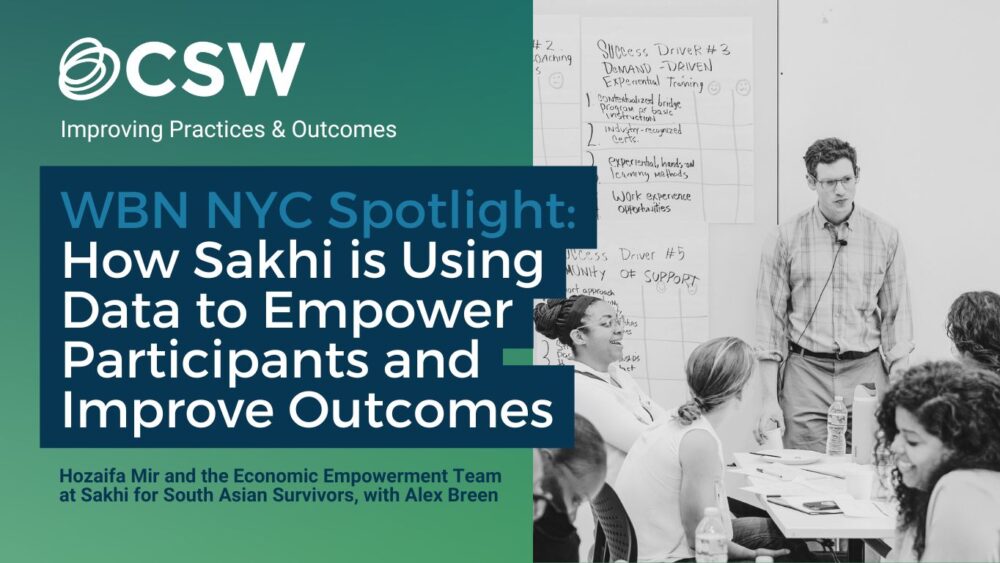There is a growing expectation that workforce nonprofits need to more comprehensively capture and communicate the impact of their work to sustain funding and to grow. At the same time, scarce resources, understaffing, and a shortage of training opportunities have made it more difficult than ever for organizations to collect funder-required data, much less supplemental qualitative data to inform programmatic improvements. To better understand how resource-limited nonprofit organizations are navigating this issue and capturing their data story, Corporation for a Skilled Workforce (CSW) conducted interviews with practitioners across the country.
Sakhi for South Asian Survivors is a New York City-based gender justice organization dedicated to addressing gender-based violence within South Asian and Indo-Caribbean communities. Sakhi participated in the 2024 Workforce Benchmarking Network (WBN) New York City cohort, facilitated by CSW. WBN cohorts bring together workforce service providers from a specific region to learn more deeply about their program data and how to use it to improve participant outcomes. Below, Hozaifa Mir and the Economic Empowerment Team details the evolution of Sakhi’s data culture from viewing data as a tool for reporting to funders, to seeing data as a pillar of strategic decision-making.
CSW: Please introduce Sakhi. What does your organization do? What does your organization hope to achieve?
Hozaifa: Sakhi for South Asian Survivors is a New York City-based, 36-year-old gender justice organization dedicated to addressing gender-based violence within South Asian and Indo-Caribbean communities. We provide South Asian survivors with trauma-informed, holistic programming in eight South Asian languages, offering legal aid, financial empowerment, youth programming, mental health counseling, housing support, and food security. These are integral to our crisis intervention and case management programs for survivors of domestic violence, sexual assault, and other forms of abuse.
In addition to direct support, we work to challenge systemic inequities by advocating for survivors’ rights, raising awareness, and fostering social change. At Sakhi, our mission is to provide the tools that enable individuals and families to build lives of dignity, free from violence.
CSW: Why did you apply to be a part of the 2024 WBN NYC cohort? What problem were you hoping to solve as a result of your participation?
Hozaifa: Sakhi joined the 2024 WBN NYC cohort to strengthen its ability to use data in meaningful ways to better understand and address the complex challenges faced by the vulnerable population we serve. By participating in the cohort, we aimed to develop a more robust internal data infrastructure to track outcomes, measure impact, and guide decision-making. We were eager to learn how to use data to advocate more effectively for policy changes and resources while improving our internal processes for program evaluation.
CSW: How has Sakhi’s data culture evolved through its participation in the WBN NYC cohort? How has the cohort impacted how you measure your impact?
Hozaifa: Participation in the WBN NYC cohort has significantly transformed our approach to data. We have shifted from viewing data primarily as a tool for reporting to funders to seeing it as a powerful asset for strategic planning for team members within our programs. Through the cohort, we have developed new systems and practices for collecting, analyzing, and visualizing data that aligns with our trauma-informed approach and have allowed us to more clearly articulate our impact on the communities we serve. Importantly, the cohort fostered a culture of collaboration, ensuring that team members value and engage with data to inform their work. One example of this is us incorporating feedback surveys in client events to provide direct feedback to team members on what works best for survivors. We believe this approach grounds itself in the needs of the survivors and allows us to provide holistic services that meet our survivors where they are.
CSW: Thinking ahead, how do you see this practice evolution impacting your strategy and impact? What do you hope to achieve?
Hozaifa: Our evolution in data practices is set to have a significant impact on our program’s long-term strategy. By embedding data into decision-making processes, we can more effectively allocate resources, identify emerging needs, and refine our programs to maximize impact. Additionally, the ability to demonstrate measurable outcomes will strengthen Sakhi’s case for funding and advocacy, enabling the organization to scale its efforts and expand its reach. Ultimately, Sakhi aims to not only empower survivors but also influence systemic change to reduce the prevalence of gender-based violence in the South Asian and Indo-Caribbean diaspora – and beyond.
CSW: What advice what you give to other organizations, like those in New York City, who might be debating whether to participate in an upcoming WBN Cohort?
Hozaifa: For organizations debating whether to participate in a future WBN cohort, we would strongly encourage you to do so. The cohort provides invaluable tools, frameworks, and mentorship to enhance data-driven decision-making and storytelling. It fosters a collaborative environment where participants can learn from peers and build lasting networks. For organizations in New York City, especially those working with marginalized communities, the cohort offers a chance to amplify their impact and create more sustainable systems for growth and advocacy. One aspect of the program that we greatly appreciated was that Alex and Chioke [WBN NYC cohort facilitators] were dedicated to meeting each organization where they were, and did not take a one-size-fits-all approach. They looked at the unique characteristics of each organization and built a data culture that reflects the needs and priorities of that organization. This helped us design data practices that reflected our mission of being survivor-led and trauma-informed.
Applications are open for NYCETC members interested in joining the 2025 WBN NYC cohort. Organizations interested in joining the 2025 WBN NYC cohort, launching in January 2025, can submit a letter of intent through the following link. Letters of intent will be accepted until 11:59 PM on January 10th.



Comments are closed.